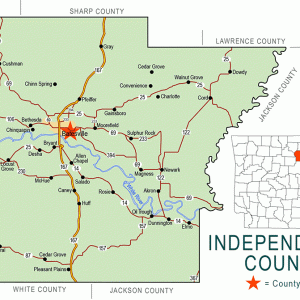calsfoundation@cals.org
Aydelott (Independence County)
Aydelott is a historic community in Independence County located on Highway 14 between Oil Trough (Independence County) and Macks (Jackson County) in Oil Trough Township. The name derives from the Aydelott family from Cleveland County, North Carolina.
The White River bottoms in what became known as Pleasant Island, and later Oil Trough, first became a popular area for bear hunting by the French before the Louisiana Purchase of 1803. The rich alluvial soil beckoned farmers who grew cotton and corn in the early days of settlement, tolerating the frequent floods. The corn was also used to make moonshine, which proved almost as profitable as trading bear oil down the river.
Alfred Paisley Aydelott first journeyed to Little Rock (Pulaski County) to sell merchandise, then on to Elizabeth (Jackson County) on the Black River near Jacksonport (Jackson County). In 1844, he bought 240 acres of White River bottom land from Joe Egner. He cleared 200 acres of it, during which time he married and started a family. The story goes that Alfred Aydelott brought the first stock of goods to be sold in Oil Trough. He not only became a successful farmer but also was known for his fine livestock and bountiful orchards. He and his wife, Martha, are buried in the Aydelott Cemetery on the family farm.
Aydelott was a supporter of the Whig Party, which championed a strong national role in regional economic development and other issues, running counter to the more limited states-rights philosophy of the Democrats. This meant that he was hesitant about supporting the secession movement in Arkansas but was eventually convinced to go with the Confederacy and become a Southern Democrat. From family records, it appears the Whig Party was popular in the Oil Trough bottoms among the planters before the Civil War, with political meetings held from time to time at Aydelott, Hulsey Bend (Independence County), and Oil Trough.
Alfred and Martha Aydelott had five children. Their son, Alfred Paisley Adyelott Jr., married Margaret Octavine Duck, daughter of the prominent landowner in the bottoms, Richard Madison Duck from North Carolina, who had brought his family to Arkansas in 1850 and served in Crabtree’s Arkansas Confederate Cavalry during the Civil War. Duck’s grandparents, both paternal and maternal, had served in the Revolutionary War, with the maternal grandfather having been a captain in the Continental Army in the Battle of King’s Mountain in South Carolina. By the time Alfred Aydelott Jr. and Margaret Duck married, her father owned 233 acres of bottomland, with about 100 acres under cultivation.
The Aydelott and Duck families were active members of the Methodist Episcopal Church in Oil Trough. Alfred Aydelott and Richard Duck were lodge brothers at McGuire Masonic Lodge No. 208 in Oil Trough, named for local farmer Edwin R. McGuire, who was one of the original founders of the Oil Trough Academy. The McGuire Lodge was later moved to Thida (Independence County). The Aydelott family owned and operated a general merchandise store on their farm but never had a post office. A cotton gin and a blacksmith shop served the needs of the farmers.
The Aydelott school was mainly for the children of the farm workers. It merged with the Elmo School before 1936. Elmo (Independence County) merged with Oil Trough in the 1940s, and Oil Trough is today part of the consolidated Cedar Ridge District with the main campus at Newark (Independence County).
Changing times that brought an end to the sharecropping system of cotton production led to the disappearance of the Aydelott community, as did the mechanization of cotton picking in the 1960s. The Aydelott Cemetery is surrounded by open fields of mainly soybeans and a few farm houses with out-buildings.
For additional information:
Biographical and Historical Memoirs of Northeast Arkansas. Chicago: Goodspeed Publishing Company, 1889.
McGinnis, A. C. “Farming in Oil Trough, 1904–1960.” Independence County Chronicle 13 (July 1972): 27–39.
———. “A History of Independence County, Ark.” Special issue. Independence County Chronicle 17 (April 1976).
Kenneth Rorie
Van Buren, Arkansas
 Aydelott Cemetery
Aydelott Cemetery  Independence County Map
Independence County Map 



Comments
No comments on this entry yet.